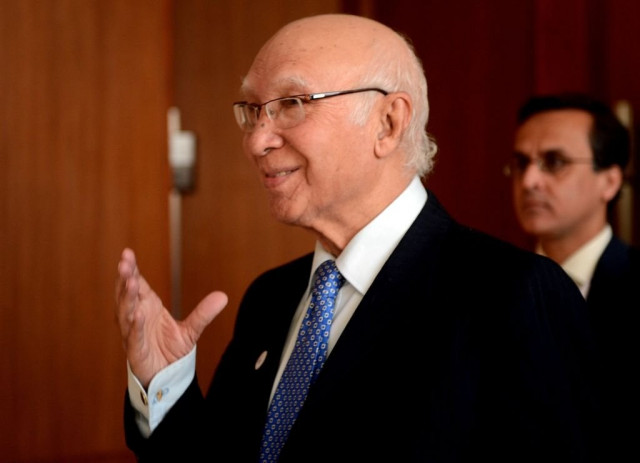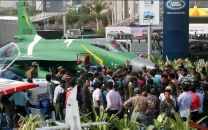Pakistan sees chance for Afghan peace talks to resume after April election
Main obstacle to US-backed effort to get talks going has been Taliban's reluctance to engage in talks with Karzai...

Adviser to Prime Minister Nawaz Sharif on Foreign Affairs Sartaj Aziz. PHOTO: AFP
"My own feeling is that after the election the Taliban will probably talk to the new government more ... than the present government," Sartaj Aziz, a senior adviser to Prime Minister Nawaz Sharif on national security and foreign affairs, said in Washington.
"So one should hope that before 2014 ends some kind of dialogue will be going on," Nawaz told an audience at Johns Hopkins University's School of Advanced International Studies.
Preparing to step down after 12 years in power, Karzai has demanded that the United States restart peace talks with the Taliban, which have appeared to be frozen since the summer, as a condition for allowing US troops to remain in Afghanistan beyond 2014. The presidential election is set for April.
The Obama administration has been pressing Karzai to sign a security pact that would permit some US and NATO troops to remain in Afghanistan beyond this year, a step widely seen as needed to ensure the country does not collapse back into civil war.
A main obstacle to the US-backed effort to get peace talks going in earnest has been the Taliban's reluctance to engage in direct talks with the Karzai government and Karzai's insistence that his government take part.
Aziz said his government had no objections to allowing a senior former Taliban leader now in Pakistan to facilitate renewed peace talks, possibly by permitting him to travel to a third country.
In a move that some Afghans hoped would help rekindle the peace talks, Pakistan announced in September that it would release Mullah Abdul Ghani Baradar, the Taliban's former second-in-command, but the extent of his freedom remains unclear.
Aziz said Baradar's fate remained sensitive because the United States saw him as a security threat.
While Aziz also repeated Pakistani concerns about the future instability in Afghanistan as foreign troops withdraw, he said he did not expect a "broad civil war" as occurred in the 1990s, when the Taliban seized the Afghan capital and imposed strict conservative governance on Afghanistan.
He said that if elections are held as planned, and the new government is able to manage the security threat, "the possibility of overrun by the Taliban is not very likely."
In any case, Pakistan could seek to shield itself from insecurity in Afghanistan "by having better border management," Aziz said.



















COMMENTS
Comments are moderated and generally will be posted if they are on-topic and not abusive.
For more information, please see our Comments FAQ